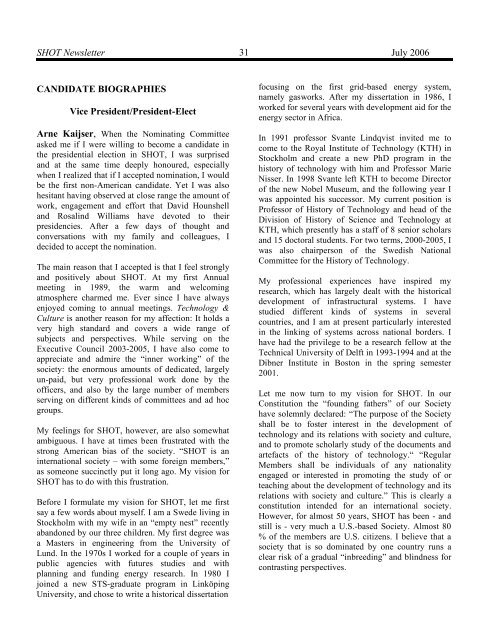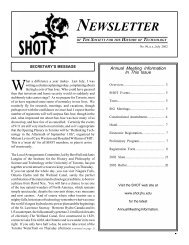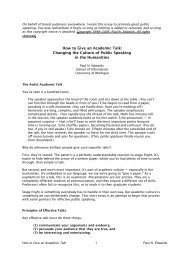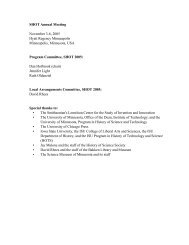In This Issue - Society for the History of Technology
In This Issue - Society for the History of Technology
In This Issue - Society for the History of Technology
Create successful ePaper yourself
Turn your PDF publications into a flip-book with our unique Google optimized e-Paper software.
SHOT Newsletter 31<br />
July 2006<br />
CANDIDATE BIOGRAPHIES<br />
Vice President/President-Elect<br />
Arne Kaijser, When <strong>the</strong> Nominating Committee<br />
asked me if I were willing to become a candidate in<br />
<strong>the</strong> presidential election in SHOT, I was surprised<br />
and at <strong>the</strong> same time deeply honoured, especially<br />
when I realized that if I accepted nomination, I would<br />
be <strong>the</strong> first non-American candidate. Yet I was also<br />
hesitant having observed at close range <strong>the</strong> amount <strong>of</strong><br />
work, engagement and ef<strong>for</strong>t that David Hounshell<br />
and Rosalind Williams have devoted to <strong>the</strong>ir<br />
presidencies. After a few days <strong>of</strong> thought and<br />
conversations with my family and colleagues, I<br />
decided to accept <strong>the</strong> nomination.<br />
The main reason that I accepted is that I feel strongly<br />
and positively about SHOT. At my first Annual<br />
meeting in 1989, <strong>the</strong> warm and welcoming<br />
atmosphere charmed me. Ever since I have always<br />
enjoyed coming to annual meetings. <strong>Technology</strong> &<br />
Culture is ano<strong>the</strong>r reason <strong>for</strong> my affection: It holds a<br />
very high standard and covers a wide range <strong>of</strong><br />
subjects and perspectives. While serving on <strong>the</strong><br />
Executive Council 2003-2005, I have also come to<br />
appreciate and admire <strong>the</strong> “inner working” <strong>of</strong> <strong>the</strong><br />
society: <strong>the</strong> enormous amounts <strong>of</strong> dedicated, largely<br />
un-paid, but very pr<strong>of</strong>essional work done by <strong>the</strong><br />
<strong>of</strong>ficers, and also by <strong>the</strong> large number <strong>of</strong> members<br />
serving on different kinds <strong>of</strong> committees and ad hoc<br />
groups.<br />
My feelings <strong>for</strong> SHOT, however, are also somewhat<br />
ambiguous. I have at times been frustrated with <strong>the</strong><br />
strong American bias <strong>of</strong> <strong>the</strong> society. “SHOT is an<br />
international society – with some <strong>for</strong>eign members,”<br />
as someone succinctly put it long ago. My vision <strong>for</strong><br />
SHOT has to do with this frustration.<br />
Be<strong>for</strong>e I <strong>for</strong>mulate my vision <strong>for</strong> SHOT, let me first<br />
say a few words about myself. I am a Swede living in<br />
Stockholm with my wife in an “empty nest” recently<br />
abandoned by our three children. My first degree was<br />
a Masters in engineering from <strong>the</strong> University <strong>of</strong><br />
Lund. <strong>In</strong> <strong>the</strong> 1970s I worked <strong>for</strong> a couple <strong>of</strong> years in<br />
public agencies with futures studies and with<br />
planning and funding energy research. <strong>In</strong> 1980 I<br />
joined a new STS-graduate program in Linköping<br />
University, and chose to write a historical dissertation<br />
focusing on <strong>the</strong> first grid-based energy system,<br />
namely gasworks. After my dissertation in 1986, I<br />
worked <strong>for</strong> several years with development aid <strong>for</strong> <strong>the</strong><br />
energy sector in Africa.<br />
<strong>In</strong> 1991 pr<strong>of</strong>essor Svante Lindqvist invited me to<br />
come to <strong>the</strong> Royal <strong>In</strong>stitute <strong>of</strong> <strong>Technology</strong> (KTH) in<br />
Stockholm and create a new PhD program in <strong>the</strong><br />
history <strong>of</strong> technology with him and Pr<strong>of</strong>essor Marie<br />
Nisser. <strong>In</strong> 1998 Svante left KTH to become Director<br />
<strong>of</strong> <strong>the</strong> new Nobel Museum, and <strong>the</strong> following year I<br />
was appointed his successor. My current position is<br />
Pr<strong>of</strong>essor <strong>of</strong> <strong>History</strong> <strong>of</strong> <strong>Technology</strong> and head <strong>of</strong> <strong>the</strong><br />
Division <strong>of</strong> <strong>History</strong> <strong>of</strong> Science and <strong>Technology</strong> at<br />
KTH, which presently has a staff <strong>of</strong> 8 senior scholars<br />
and 15 doctoral students. For two terms, 2000-2005, I<br />
was also chairperson <strong>of</strong> <strong>the</strong> Swedish National<br />
Committee <strong>for</strong> <strong>the</strong> <strong>History</strong> <strong>of</strong> <strong>Technology</strong>.<br />
My pr<strong>of</strong>essional experiences have inspired my<br />
research, which has largely dealt with <strong>the</strong> historical<br />
development <strong>of</strong> infrastructural systems. I have<br />
studied different kinds <strong>of</strong> systems in several<br />
countries, and I am at present particularly interested<br />
in <strong>the</strong> linking <strong>of</strong> systems across national borders. I<br />
have had <strong>the</strong> privilege to be a research fellow at <strong>the</strong><br />
Technical University <strong>of</strong> Delft in 1993-1994 and at <strong>the</strong><br />
Dibner <strong>In</strong>stitute in Boston in <strong>the</strong> spring semester<br />
2001.<br />
Let me now turn to my vision <strong>for</strong> SHOT. <strong>In</strong> our<br />
Constitution <strong>the</strong> “founding fa<strong>the</strong>rs” <strong>of</strong> our <strong>Society</strong><br />
have solemnly declared: “The purpose <strong>of</strong> <strong>the</strong> <strong>Society</strong><br />
shall be to foster interest in <strong>the</strong> development <strong>of</strong><br />
technology and its relations with society and culture,<br />
and to promote scholarly study <strong>of</strong> <strong>the</strong> documents and<br />
artefacts <strong>of</strong> <strong>the</strong> history <strong>of</strong> technology.“ “Regular<br />
Members shall be individuals <strong>of</strong> any nationality<br />
engaged or interested in promoting <strong>the</strong> study <strong>of</strong> or<br />
teaching about <strong>the</strong> development <strong>of</strong> technology and its<br />
relations with society and culture.” <strong>This</strong> is clearly a<br />
constitution intended <strong>for</strong> an international society.<br />
However, <strong>for</strong> almost 50 years, SHOT has been - and<br />
still is - very much a U.S.-based <strong>Society</strong>. Almost 80<br />
% <strong>of</strong> <strong>the</strong> members are U.S. citizens. I believe that a<br />
society that is so dominated by one country runs a<br />
clear risk <strong>of</strong> a gradual “inbreeding” and blindness <strong>for</strong><br />
contrasting perspectives.





